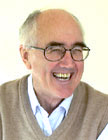 |
Is the Internet Redefining Knowledge? James Burke PBS/BBC Multidisciplinary Journalist Friday, October 5th, 2001 |
|
“One of the most intriguing minds in the Western world.” |
|
|
Who is James Burke?
James Burke has been called "One of the most intriguing minds in the Western world." (Washington Post). Thanks to satellite and cable technology, his audience is global. His influence in the field of the public understanding of science and technology is acknowledged in citations by, among many others, Vice President Al Gore and Microsoft CEO Bill Gates. His work is on the curriculum of universities and schools across the United States. In 1965 James Burke began work with BBC-TV on Tomorrow's World and went on to become the BBCs chief reporter on the Apollo Moon missions. For over thirty years he has produced, directed, written and presented award-winning television serie ' s on the BBC, PBS and The Learning Channel. These include historical series, such as Connections (aired in 1979, it achieved the highest-ever Documentary audience), The Day the Universe Changed, and Connections2; a one-man science series, The Burke Special; a mini-series on the brain, The Neuron Suite; a series on the greenhouse effect, After the Warming and a special for the National Art Gallery on Renaissance painting, Masters of Illusion. A bestselling author, his publications include: Tomorrow's World, Tomorrow's World IL Connections, The Day the Universe Changed, Chances, The Axemaker's Gift (with Robert Ornstein), The Pinball Effect and The Knowledge Web. Burke has also written and hosted a bestselling CD-ROM titled: Connections: A Mind Game. Burke is a frequent keynote speaker on the subject of technology and social change to audiences such as NASA, MIT, IBM, Microsoft, US Government Agencies and the World Affairs Council. He writes a monthly column for Scientific American. His most recent television work is the ten-hour technology history series for The Learning Channel: Connections3. His latest book, Circles, will be published by Simon & Schuster in Fall 2000. He is at present working on a large interactive knowledge system which is due online in 2002. Burke was educated at Oxford and also holds honorary doctorates for his work in communicating science and technology. |
Why is it so difficult to predict the future? In ‘The Culture of Scarcity’ James Burke takes a light-hearted look at the mysterious process of change at how today’s accelerating rate of innovation was triggered five hundred years ago by the greatest surprise in history and at why, as a result, twenty-first-century information technologies may redefine the nature of knowledge, and give us all the ability to shape tomorrow. In our increasingly complex world, where change is the only constant, no one is better equipped to explain the shifting technological landscape than James Burke. His influence in the field of the public understanding of science and technology is acknowledged in citations by, among many others, Microsoft CEO Bill Gates. His work is on the curriculum of universities and schools across the United States. For over thirty years he has produced, directed, written and presented award-winning television series on the BBC, PBS and Discovery’s Learning Channel; such as Connections (highest-ever documentary audience), and The Day the Universe Changed. A bestselling author, his most recent publications include: The Axemaker’s Gift (with Robert Ornstein), The Pinball Effect, The Knowledge Web, and Circles. He is a regular contributor to Scientific American and Forbes ASAP. |